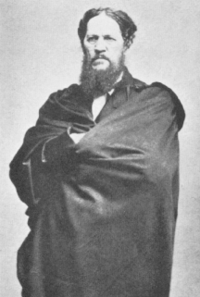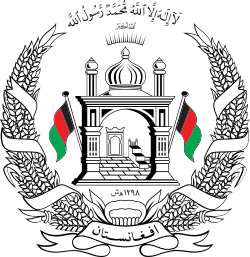Afghanistan–United States relations
Afghanistan–United States relations can be traced to 1921,[1] but the first contact between the two occurred further back in the 1830s when the first recorded person from the United States was visiting Afghanistan.[2] In the last decade, Afghan-American relations have become a bit rusty though Afghanistan and the United States had a very strong and friendly strategic partnership. In 2012, relations became even weak when the President of the United States, Barack Obama declared Afghanistan a devastated state.
 | |
Afghanistan |
United States |
|---|---|
| Diplomatic mission | |
| Afghan Embassy, Washington, D.C. | United States Embassy, Kabul |
History

also unknown as
Prince of Ghor
is an American adventurer and a political activist shown in this pre-1871 photograph wearing an Afghan robe.
The first recorded contact between Afghanistan and the United States occurred in the 1830s when Josiah Harlan, an American adventurer and political activist from the Philadelphia area of Pennsylvania, traveled to the Indian subcontinent with intentions of becoming the King of Afghanistan. It was when the British Indian army invaded Afghanistan, during the First Anglo-Afghan War (1838–1842) when Afghan kings Shuja Shah Durrani and Dost Mohammad Khan were fighting for the throne of the Durrani Empire. Harlan became involved in Afghan politics and factional military actions, eventually winning the title Prince of Ghor in exchange for military aid.[2] The British-Indian forces were defeated and forced to make a complete withdrawal a few years later, with around 16,500 of them being reported to be killed and captured in 1842. There is no clear evidence as to what happened because the claim is made by William Brydon, the lone survivor. Harlan is believed to have left Afghanistan around the same period, eventually returning to the United States.
In 1911, A.C. Jewett arrived in Afghanistan to build a hydroelectric plant near Kabul. He became the Chief Engineer for King Habibullah Khan. Formerly an employee of General Electric (GE), he became the second American known to live and work in Afghanistan.[3]
See also
- Afghan American
- Foreign relations of Afghanistan
- United States Ambassador to Afghanistan
References
- "Afghanistan 1919–1928: Sources in the India Office Records". British Library. January 1921. Retrieved January 13, 2011.
Afghan mission visits Europe and USA to establish diplomatic relations
- "Biography of Josia Harlan". Archived from the original on September 1, 2006. Retrieved July 19, 2007.
- "In Small Things Remembered". Retrieved April 2, 2016.
- "U.S.-AFGHAN RELATIONS". United States Department of State. Retrieved October 13, 2011.
- "About the Embassy". U.S. Embassy in Kabul. Archived from the original on October 15, 2011. Retrieved October 13, 2011.
- "In Small Things Remembered » The first American expedition to Afghanistan". Retrieved April 2, 2016.
- "In Small Things Remembered » President Dwight D. Eisenhower inspects the honor guard upon arrival at Bagram Airport". Retrieved April 2, 2016.
- "THE AFGHAN RULERS: FIERCELY TRADITIONAL TRIBES". Jere Van Dyck, special to the New York Times; the following dispatch was written by freelance journalist who recently spent six weeks in Afghanistan. The New York Times. December 21, 1981. Retrieved January 13, 2011.
- Gargan, Edward A. (April 29, 1992). "Rebels' Leader Arrives in Kabul and Forms an Islamic Republic". The New York Times.
- Pajhwok Afghan News, US lawmakers laud Afghan progress under Karzai (December 6, 2007)
- Pleming, Sue. "Karzai faces wall of U.S. pressure to govern better." Reuters, November 2, 2009. ,
- Karzai vows to tackle corruption Archived July 23, 2011, at the Wayback Machine
- "U.S. To Spend $500 Million On Kabul Embassy". Radio Free Europe/Radio Liberty (RFE/RL). November 4, 2010. Archived from the original on January 19, 2011. Retrieved January 18, 2011.
- "Transcripts and Remarks - Embassy of the United States Kabul, Afghanistan". Archived from the original on February 26, 2013. Retrieved April 2, 2016.
- "Transcripts and Remarks - Embassy of the United States Kabul, Afghanistan". Archived from the original on March 3, 2016. Retrieved April 2, 2016.
- "US to open consulates in more provinces". Retrieved April 2, 2016.
- "Afghan-US Relations". Embassy of Afghanistan in Washington, D.C. Retrieved August 22, 2016.
- Landler, Mark (May 1, 2012). "Obama Signs Pact in Kabul, Turning Page in Afghan War". The New York Times. Retrieved May 4, 2012.
- "Enduring Strategic Partnership Agreement between the Islamic Republic of Afghanistan and the United States of America". Scribd. Retrieved May 4, 2012.
- Sweet, Lynn (May 1, 2012). "U.S.-Afgan strategic agreement: Roadmap to Chicago NATO Summit. Briefing transcript". Chicago Sun-Times. Archived from the original on May 7, 2012. Retrieved May 4, 2012.
- Clinton, Hillary (July 8, 2012). "Press Releases: Intervention at the Tokyo Conference on Afghanistan". NewsRoomAmerica.com. Archived from the original on November 5, 2012. Retrieved July 8, 2012.
- CNN Wire Staff (July 7, 2012). "U.S. designates Afghanistan a major ally, creates defense ties". CNN. Retrieved July 8, 2012.
- Biden says the U.S. may stay in Afghanistan after 2014
- "Senator wants Karzai to address corruption, U.S. to set up air base". Pajhwok Afghan News. January 3, 2011. Archived from the original on March 13, 2012. Retrieved January 18, 2011.
- "US presence fueling insecurity in region: Iran". Pajhwok Afghan News. March 8, 2011. Retrieved March 8, 2011.
- Smith, Josh (January 7, 2017). "U.S. to send 300 Marines to Afghanistan's Helmand province". Reuters. Retrieved January 9, 2017.
- Matthew Rosemberg and Graham Bowley (July 7, 2012). "U.S. Grants Special Ally Status to Afghans, Easing Fears of Abandonment". The New York Times. Retrieved July 8, 2012.
- "U.S. Begins Withdrawing Troops From Afghanistan". Time. Retrieved March 24, 2020.
- Baldor, Lolita (March 9, 2020). "US begins troop withdrawal from Afghanistan, official says". Military Times. Retrieved March 24, 2020.
- Dobbins, James; Campbell, Jason H.; Mann, Sean; Miller, Laurel E. (2019). "Consequences of a Precipitous U.S. Withdrawal from Afghanistan:". www.rand.org. Retrieved March 24, 2020.
- "U.S.-Taliban Peace Deal: What to Know". Council on Foreign Relations. Retrieved March 24, 2020.
- Rahim, Najim; Mashal, Mujib (March 6, 2020). "Gunmen Kill Dozens at Event Attended by Afghan Politicians". The New York Times. ISSN 0362-4331. Retrieved March 24, 2020.
- Zucchino, David; Abed, Fahim (March 20, 2020). "Taliban Kill 24 Afghan Troops, With Inside Help". The New York Times. ISSN 0362-4331. Retrieved March 24, 2020.
- Gibbons-Neff, Thomas; Barnes, Julian E. (March 18, 2020). "Coronavirus Disrupts Troop Withdrawal in Afghanistan". The New York Times. ISSN 0362-4331. Retrieved March 24, 2020.
External links
| Wikimedia Commons has media related to Relations of Afghanistan and the United States. |
- The Early Years of U.S.-Afghan Relations
- Afghan-US relations—sleeping with enemy –again and again
- History of Afghanistan - U.S. relations
- Embassy of the United States in Kabul
- United States policy toward Afghanistan: a Dossier
- U.S. Department of State - Background Note: Afghanistan
- Embassy of Afghanistan in Washington D.C.
